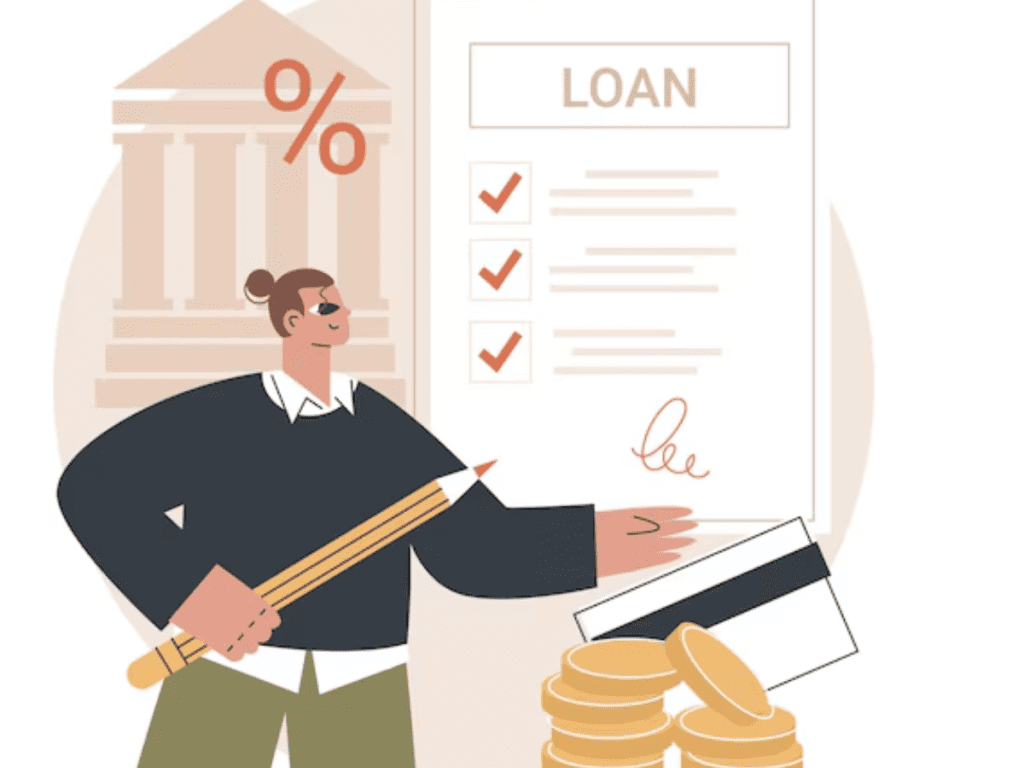Introduction
As for taking loans, two of the most popular money borrowing products are personal loans and credit card loans. Both can get you ready money in short order, yet both have other terms, conditions, and structures when it comes to paying it back. What’s important here is knowing what differentiates them because that would help you choose what is most appropriate given your existing situation, needs, and aspirations.
In this article, we will explore in greater detail the features, advantages, and disadvantages of personal loans and credit card loans, assisting you in making the correct decision for your borrowing requirements.
What is a Personal Loan?
A personal loan is an unsecured loan that gives the borrower a sum of money in one go. The loan is usually paid back within a specific period, which can be one to five years. Personal loans can be utilized for numerous purposes, including paying medical bills, financing home improvements, consolidating current debts, or financing major purchases. The interest rates on personal loans are usually fixed, meaning that you will have a fixed amount that you will pay each month until the loan is paid in its entirety.
Personal loans are usually offered by banks, credit unions, and online lenders and have relatively lower interest rates than credit card loans, especially for people with good credit scores.
Major Features of Personal Loans
- Amount of the Loan: The amount of the loan may differ based on the lender and your credit score. The standard loan amount is a few thousand rupees to a few lakhs of rupees.
- Interest Rate: Personal loans have lower interest rates than credit card loans. Interest rates are based on your credit score, financial record, and lender, usually between 10% and 24% per annum.
- Repayment Period: Personal loans have a fixed repayment term, typically between one to five years. The repayment is broken down into monthly installments (EMIs), which is convenient to manage your budget.
- Approval Process: The personal loan approval process generally entails presenting paperwork like evidence of income, credit report, and employment status.
- Secured vs. Unsecured: Personal loans are usually unsecured, i.e., no collateral or asset needs to be put up by the borrower.
What is a Credit Card Loan?
A credit card loan or credit card cash advance is essentially a loan by which you can borrow funds from the issuer of your credit card. It differs from a normal credit card purchase. With a credit card loan, you are either able to take cash from an ATM or purchase up to the amount available as credit on your card. The interest rates on credit card loans tend to be higher compared to personal loans, and the repayment terms are often more flexible, but they come with their own set of challenges.
Credit card loans are typically more suitable for smaller, short-term financial needs. While they offer the convenience of accessing cash quickly, they can also lead to high-interest charges if the balance is not repaid promptly.
Major Features of Credit Card Loans
- Loan Amount: The amount for which you are eligible to obtain a loan in the form of a credit card loan is set by your existing credit limit depending on your issuing bank, your credit score, and usage history.
- Interest Rate: The loans provided through credit cards are of very high interest, typically ranging from 15% to 30% per year. It may rise even more if you don’t return the loan amount within the period of grace.
- Repayment Term: Credit card loans do not have any fixed repayment term, as is the case with personal loans. However, if you opt for a balance carryover, you will be asked to make minimum monthly payments. The outstanding amount will keep piling up interest, unless paid in full.
- Approval Process: Credit card loans do not have a distinct application process because the loan is secured by the available credit limit on your credit card. This results in the approval process being almost instant, and money is immediately available.
- Secured vs. Unsecured: Credit card loans are unsecured loans, i.e., they don’t need collateral, but the lender can pursue action against you if you fail to make your payments.
Personal Loan vs. Credit Card Loan: Key Differences
Though personal loans and credit card loans are both easy to use when in need of funds, they contrast greatly with regards to interest charges, repayment, loan value, and the ability to qualify for them. Here are the most important differences between the two:
1. Interest Rates
- Personal Loans: Personal loans generally have lower interest rates than credit card loans, particularly for those who have a good credit report. Interest rates usually range from 10% to 24% per year, varying with the lender and your creditworthiness.
- Credit Card Loans: Credit card loans usually have far higher interest rates, normally between 15% and 30% per annum. If you do not pay the outstanding amount during the grace period, the interest keeps on building up, and you may have to pay much more than the original amount borrowed.
2. Loan Amount and Flexibility
- Personal Loans: Personal loans tend to let you borrow more money, usually ranging from a few thousand to a few lakhs of rupees. This is more suitable for higher expenses like home improvement or hospital bills. Personal loans provide fixed sums disbursed as a lump sum amount that is to be repaid later.
- Credit Card Loans: Credit card loans have a cap as per your credit limit, and that may fall short of expenses for major amounts. They provide greater flexibility in the sense that you can use smaller sums if needed. The loan can be used for smaller purchases to emergent cash needs, but their sizes are comparatively smaller than with personal loans.
3. Repayment Terms
- Personal Loans: Another advantage of personal loans is that they provide a fixed payment schedule. You need to return the loan through equal monthly payments (EMIs) over a predetermined duration. This simplifies it for you to plan your finances and control your budget since you are well aware of the amount you must pay every month.
- Credit Card Loans: Credit card loans are far more adaptable when it comes to payment. While there is a minimum monthly payment, you are free to pay off the balance in a shorter time period. Yet, if you do not pay the balance in full, interest charges will keep building up, and it will become increasingly hard to pay off the loan in the long run.
4. Eligibility Criteria
- Personal Loans: Personal loans have stringent eligibility requirements. The lender will check your credit score, income, and financial standing to see if you are eligible for the loan. The documents that may be required include proof of income, credit score, and identification information.
- Credit Card Loans: Credit card loans are simpler to obtain since they are founded on your available credit limit. There is no drawn-out approval procedure because the loan is essentially taken against your accessible credit. Yet, your lending ability is only up to the credit limit that the issuer has established.
5. Loan Disbursement Process
- Personal Loans: It would take a few days or weeks to apply for and receive approval for a personal loan. The lenders need some time to process your application and documents before releasing the funds.
- Credit Card Loans: Credit card loans are released immediately since they are attached to your current credit card. You can get cash from an ATM or make purchases right away, making credit card loans a good choice for emergency financial needs.
Advantages and Disadvantages of Personal Loans and Credit Card Loans
Personal Loan Advantages:
- Lower Interest Rates: Personal loans generally have lower interest rates, which makes them more suitable for long-term borrowing.
- Fixed Repayment Schedule: In personal loans, you have a clear idea of how much you need to pay every month, which makes it easier to budget.
- Larger Loan Amounts: Personal loans enable you to borrow more, so they’re most suitable for expensive purchases.
- Structured Loan Terms: Personal loans have structured terms and transparent conditions, making it simple to plan your finances.
Personal Loan Cons:
- Longer Approval Process: Approval for personal loans may be slow, since lenders demand documents and verification.
- Documentation Requirements: More documentation, such as proof of income, bank statements, and other financial reports, may be demanded in the case of personal loans.
- Fixed Monthly Payments: Although the fixed payment arrangement works well in planning your expenses, it is tough if you find yourself suddenly unable to manage.
Credit Card Loan Advantages:
- Easy Access to Money: It is very simple to use a credit card loan, without an application involved. You are immediately able to take out cash or make a purchase.
- Flexibility: Credit card loans enable you to borrow small amounts and pay them back in your own time, without a fixed repayment schedule.
- No Documentation Required: As the loan is tied to your current credit card, no extra documentation is required for approval.
Credit Card Loan Cons:
- High Interest Rates: High interest rates are associated with credit card loans, which can lead to high debt if not cleared on time.
- Debt Accumulation: Paying only the minimum amount every month, the charges for interest are likely to mount up rapidly, making it increasingly difficult to clear the balance.
- Limited Loan Amounts: Your ability to borrow is restricted to the available credit limit, which is likely to fall short of expensive purchases.
Which One to Pick?
Whether to pick a credit card loan or a personal loan depends on a variety of factors, including the amount of loan, your objectives, flexibility to repay, and interest rates. Here is a brief guide to assist you in deciding:
Opt for a Personal Loan When:
- You require an amount of loan for a high-value expense, like home maintenance or medical expenses.
- You like a fixed repayment schedule that allows you to plan your finances well.
- You possess a good credit score and can avail of a lower interest rate.
- You are able to take a long-term repayment schedule and require structured loan terms.
Opt for a Credit Card Loan if:
- You require a small loan amount for short-term expenses, like an emergency purchase or a medical crisis.
- You already possess a high-limit credit card.
- You will be able to pay the loan within the grace period to not pay a lot of interest charges.
- You like immediate and convenient access to money without subjecting yourself to a formal application process for a loan.
Conclusion
Both credit card loans and personal loans have their pros and cons. A credit card loan is best for small, short-term needs, whereas a personal loan is best used for large, long-term expenses. Knowing the differences between the two will assist you in selecting the choice that best suits your financial condition and borrowing needs.
By taking into account aspects like interest rates, repayment plans, loan values, and qualifications, you are better able to decide which type of loan best suits your purposes.

